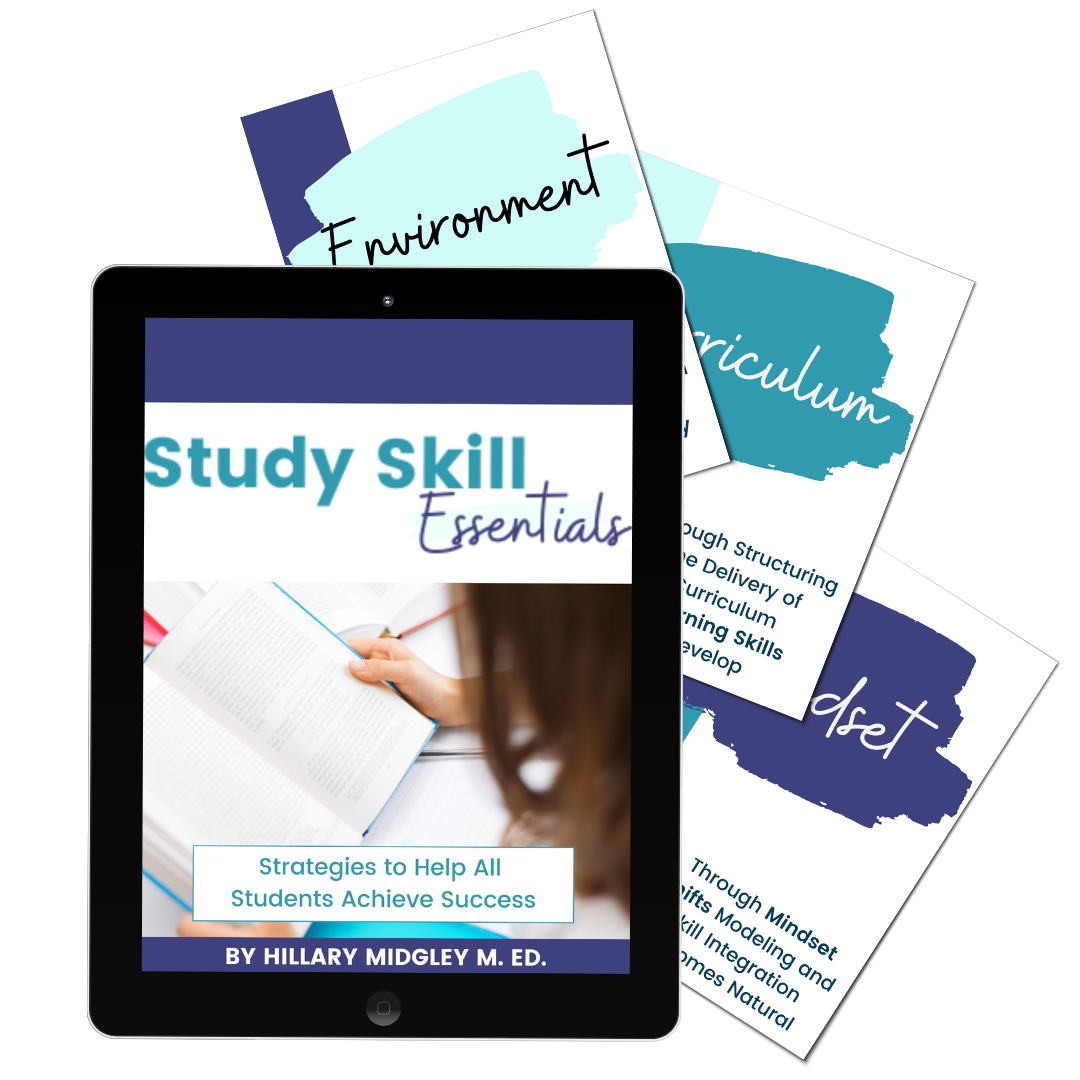9 Best Ways to Improve Test Scores
As teachers, we often deal with pressures to get students to perform on tests.
That pressure might come from the state, our administrators, parents, or even colleagues.
And it can often feel like we are banging our head on the wall, since we can’t exactly control our students’ every action and whether or not they choose to put forth any effort.
It seems that the message... if students are doing poorly on tests it’s the teacher’s fault... has just become too common.
That pressure might come from the state, our administrators, parents, or even colleagues.
And it can often feel like we are banging our head on the wall, since we can’t exactly control our students’ every action and whether or not they choose to put forth any effort.
It seems that the message... if students are doing poorly on tests it’s the teacher’s fault... has just become too common.
I think we can all agree there are many factors at play in regards to whether or not a student will perform well on a test.
Some factors that come to mind:
+ Student Effort
+ Support for Academics at Home
+ Student Skills and Ability
+ Quality of Home Life
+ Daily Life Events
+ Student Needs Met – sleep and food
Just to name a few.
And you will notice, that the factors on the list above are all out of the teacher’s control.
In fact, some of them are even out of the student’s control.
However, despite all of these challenges, teachers are still fighting tooth and nail to help their students find success. Mostly because we care so much.
I’m happy to share with you that there are also other factors that affect a student’s performance on tests. And many of these factors can be controlled by teachers.
In this post, I’m going to share with you 9 ways teachers can improve test scores.
Some factors that come to mind:
+ Student Effort
+ Support for Academics at Home
+ Student Skills and Ability
+ Quality of Home Life
+ Daily Life Events
+ Student Needs Met – sleep and food
Just to name a few.
And you will notice, that the factors on the list above are all out of the teacher’s control.
In fact, some of them are even out of the student’s control.
However, despite all of these challenges, teachers are still fighting tooth and nail to help their students find success. Mostly because we care so much.
I’m happy to share with you that there are also other factors that affect a student’s performance on tests. And many of these factors can be controlled by teachers.
In this post, I’m going to share with you 9 ways teachers can improve test scores.
#1 - Quality Study Guide
Teachers should be providing students with a quality study guide at least 2-3 days before test day.
An effective study guide is not just a list of practice questions. Perhaps it may include a few, but there is much more to include if it is to truly serve its purpose.
Unfortunately, I hear teachers say they don’t give out study guides because they don’t want to give away their test.
Well, I’m here to assure you that you CAN provide your students with a quality study guide that does not give away your test.
No matter what subject you teach, history, science, math or ELA, a quality study guide includes 3 components: key vocabulary, main concepts/objectives, and skills students will be expected to perform on the test. Learn more about Creating an Effective Study Guide Using the 3 Step Template.
An effective study guide is not just a list of practice questions. Perhaps it may include a few, but there is much more to include if it is to truly serve its purpose.
Unfortunately, I hear teachers say they don’t give out study guides because they don’t want to give away their test.
Well, I’m here to assure you that you CAN provide your students with a quality study guide that does not give away your test.
No matter what subject you teach, history, science, math or ELA, a quality study guide includes 3 components: key vocabulary, main concepts/objectives, and skills students will be expected to perform on the test. Learn more about Creating an Effective Study Guide Using the 3 Step Template.
#2 - Review Day
Any teacher who wants their students to succeed, will have a review day just before the test.
While many teachers are tempted to play review games to boost student engagement, I would advise against it.
Students need you to teach them proper study techniques for your content.
Review day is the perfect opportunity to show them study methods and have students actually perform those methods in class – whether it be as a whole class, in small groups, with partners, or individually.
Once students understand how they can study your content independently, then you can incorporate the review games. (Perhaps the second half of the school year.)
While many teachers are tempted to play review games to boost student engagement, I would advise against it.
Students need you to teach them proper study techniques for your content.
Review day is the perfect opportunity to show them study methods and have students actually perform those methods in class – whether it be as a whole class, in small groups, with partners, or individually.
Once students understand how they can study your content independently, then you can incorporate the review games. (Perhaps the second half of the school year.)
#3 - Inform Students of Test Format
Inform your students of the test format. On review day, I stand at the front of the class (or on camera) with a copy of the test in my hand.
I flip through and tell them exactly what they will have to do.
15 multiple choice questions
5 short answer questions
1 essay
3 questions using this timeline
3 questions using this map
1 diagram to label
I don’t show them specific questions or anything, but this simple strategy relieves so much anxiety in your students.
I flip through and tell them exactly what they will have to do.
15 multiple choice questions
5 short answer questions
1 essay
3 questions using this timeline
3 questions using this map
1 diagram to label
I don’t show them specific questions or anything, but this simple strategy relieves so much anxiety in your students.
#4 - Test Day - Clear Procedure & Structure
Do you have a Test Mode procedure? If you don’t, you should get one. In fact, you can click here to grab your FREE copy of my Test Mode Procedure.
You will alleviate even more stress for your students if you have firm, clear procedures for your test day.
What do students do at the start of class?
What will students do when they finish their test that won’t disrupt others who are still working?
You will alleviate even more stress for your students if you have firm, clear procedures for your test day.
What do students do at the start of class?
What will students do when they finish their test that won’t disrupt others who are still working?
#5 - Teacher Mindset
Your attitude about tests will be directly reflected in your students’ performance.
Your positive attitude and belief in your students will become infectious.
On the flip side, if you dread test day, your students will too.
Decide what you want for your students and show them that you believe they can achieve it.
Learn these Mindset Hacks to Transform Your Teaching.
Your positive attitude and belief in your students will become infectious.
On the flip side, if you dread test day, your students will too.
Decide what you want for your students and show them that you believe they can achieve it.
Learn these Mindset Hacks to Transform Your Teaching.
The last 3 tips, are in my opinion, best practices for helping students improve their own skills. They work together to create a system for students to improve their own performance.
#6 - Administer A Student Self Reflection
Have students complete the following. This is a great exercise to keep in a notebook, for reflecting back on.
Answer the following questions about the last test you took:
The last test I took was about:
This is what I did to prepare:
- completed homework
- participated in class discussions
- asked questions in or after class
- got extra help from a teacher, friend, or tutor
- reviewed the material before the test
- got enough sleep before the test
- arrived at class prepared with all materials needed
Before the test I felt:
After the test I felt:
Answer the following questions about the last test you took:
The last test I took was about:
This is what I did to prepare:
- completed homework
- participated in class discussions
- asked questions in or after class
- got extra help from a teacher, friend, or tutor
- reviewed the material before the test
- got enough sleep before the test
- arrived at class prepared with all materials needed
Before the test I felt:
After the test I felt:
#7 - Help Students Evaluate & Plan
Based on the self-reflection questions, identify one or two areas where you can improve for the next test.
Write out your plan for the next test.
Write out your plan for the next test.
#8 - Support Student Execution of the Plan
Remember that test performance is about more than just test day and the night before. Your preparation for the test begins on the first day you start the unit of study. In order to do your best, you must complete all the work, participate, and use active study methods. This will have a huge impact on your confidence level and how you feel before and after the test.
Refer back to the plan on a regular basis to help stay on track.
Refer back to the plan on a regular basis to help stay on track.
#9 - Follow Through & Circle Back
Follow through with your plan and complete the 3 step system again after the next test.
Final Thoughts...
There are many factors that affect a student’s performance on tests. It’s important for teachers to recognize the factors that can’t be controlled and focus on the steps they can take to improve test scores.
But remember test performance starts on the first day instruction, in the form of study skills that students use throughout the study of the unit. If you truly want to help students find academic success, then you should work to incorporate teaching study skills within your core content.
Not sure how to do that?
Then you'll want to check out: How to Integrate Study Skills Professional Development Training for Teachers
But remember test performance starts on the first day instruction, in the form of study skills that students use throughout the study of the unit. If you truly want to help students find academic success, then you should work to incorporate teaching study skills within your core content.
Not sure how to do that?
Then you'll want to check out: How to Integrate Study Skills Professional Development Training for Teachers
"My students have been struggling with study skills and I purchased this product to help improve my knowledge about how to teach my students study skills. This was a great purchase. It helped me to see small changes that I could add to my teaching routines and lessons to help my students with study skills in my class and prepare them for future grades/classes." - Amy B.
⭐⭐⭐⭐⭐ Extremely Satisfied |
You May Also Like...
+ 6 Effective Goal Setting Strategies for Middle Schoolers
+ 9 Strategies to Help Students Take Better Class Notes
+ 7 Dynamite Test Taking Strategies for Middle Schoolers
+ 7 Effective Ways to Teach Vocabulary in Middle School
+ 9 Strategies to Help Students Take Better Class Notes
+ 7 Dynamite Test Taking Strategies for Middle Schoolers
+ 7 Effective Ways to Teach Vocabulary in Middle School
This post was originally written by Hillary Midgley and published at Study Skills Unleashed
Let's Connect...

Welcome! I'm Hillary Midgley, a veteran 6th grade teacher.
I create educational materials and develop curriculum for other teachers. I specialize in teaching students how to learn through my Study Skills Curriculum. I have established fundamental classroom systems and structures for teachers to help them streamline their classroom. And my passion is teaching ancient history through engaging activities with foundations in academic skills. Here you will find resources on all of these topics and more. Learn more about me here.
|








